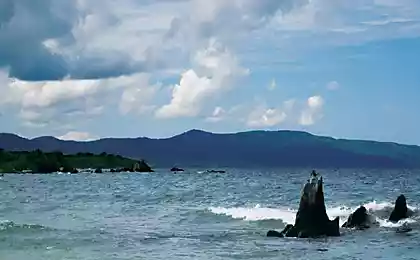1439
The most militant
Any nation is experiencing a time of active warfare and expansion. But there are tribes who militancy and violence - an integral part of their culture. This is the perfect warrior without fear and morality ....

Maori
The name of the tribe of New Zealand "Maori" means "normal", although, in truth, nothing ordinary about them. Even Charles Darwin, who had a chance to meet with them during his travels on the "Beagle", noted their cruelty, especially in relation to the white (British), with whom they had a chance to fight for territory during the Maori Wars.
Maori are considered the indigenous population of New Zealand. Their ancestors arrived on the island about 2000 years ago from East Polynesia. Prior to joining the British in the middle of the XIX century, serious enemies they did not have, fun, mostly strife. During this time, formed their unique customs, peculiar to many Polynesian tribes. For example, they beheaded captive enemies and ate their body - so, according to their beliefs, they passed the power of the enemy.
In contrast to its neighbors - the Australian Aborigines, Maoris participated in two world wars. Moreover, during World War II they insisted on forming his own 28 Battalion. By the way, it is known that during the First World War, they drove the enemy to his fighting dance "hack", during the offensive on the Gallipoli Peninsula. This ritual is accompanied by warlike cries and scary faces that literally discourage enemies and gave Maori advantage.

Other warlike people, who also fought in the side of the British - Nepalese Gurkhas. Even during the colonial policy of the British took them into the category of "most militant" peoples with whom they had to face. According to them, the Gurkhas distinguished aggressiveness in combat, courage, self-sufficiency, physical strength and reduced pain threshold.
England itself had to yield to the pressure of their warriors armed with knives alone. No wonder that even in 1815, was a wide-ranging campaign for attracting volunteers Gurkhas in the British army. Skilled fighters quickly find glory best soldiers in the world. They managed to take part in suppressing the uprising of the Sikhs, Afghan, First, Second World Wars, as well as in the Falklands conflict.
Today - Gurkhas, still, elite soldiers of the British army. Gaining them all in the same place - in Nepal. I must say, the competition for the selection of a madman - according to the portal modernarmy, 200 seats have to 28,000 candidates. British themselves admit - Gurkhas better soldiers than themselves. Maybe because they are more motivated. Although the Nepalese argue the point here is not about the money. They are proud of their martial art and is always happy to apply it in the case. Even if someone patted them on the shoulder - in their tradition is considered an insult.
I'd add that in everyday life Gurkhas find it is very calm and gentle people. But if Gurk believes that it hurt, it goes all the way - before his death or opponents, no matter how much they were not.

Dayak
When one small peoples actively integrate into the modern world, while others prefer to keep the tradition, even if they are far from the values of humanism. For example, the Dayak tribe from Kalimantan, which earned a terrible reputation as headhunters. What to do - a man can only be brought into the tribe head of his enemy. At least it was still in the XX century.
Dayak people (in Malay - "Gentile") - is an ethnic group that brings together numerous peoples inhabiting the island of Kalimantan in Indonesia. Among them: the Iban people, Kaya, Modang Language, Sega, Tring, inihingi, longvai, longhaty, otnadomy, sulfur, mardahiki, Ulu Ayer. Until today some villages can be reached only by boat.
Bloodthirsty rituals and hunting for the Dayak people's heads were officially terminated in the XIX century, when the local sultanate asked the Englishman Charles Brooke dynasty white Raja, somehow affect the people who did not know any other way to become a man, but to cut off someone's head.
Capturing the most militant leaders, "carrot and stick policy," he was able to instruct the Dayak on the path of peace. But people continued to disappear without a trace. Last bloody wave swept over the island in 1997-1999, when all the world agencies shouting about ritual cannibalism and young Dayak games with human heads.

Kalmyks
Among the peoples of Russia, one of the most militant - Kalmyks, the descendants of the western Mongols. Their self translated as "breakaway", which means Oirats not accepted Islam. Today, most of them live in the Republic of Kalmykia.
Nomads are always aggressive farmers. The ancestors of the Kalmyks - Oirats living in Dzhungaria were freedom-loving and warlike. Even Genghis Khan did not immediately able to subdue them, for which he claimed to completely destroy one of the tribes. Later Oirat soldiers joined the army of the great general, and many of them intermarried with Chingized. Therefore, not without reason, some of the modern Kalmyk consider themselves descendants of Genghis Khan.
In the XVII century Oirat left the Dzhungaria, and made a huge transition, reached the Volga steppes. In 1641, Russia recognized the Kalmyk Khanate, and now with the XVII century - Kalmyks become regular participants in the Russian army. They say that the battle cry of "Hurrah!" When something occurred to Kalmyk "Ural", which means "forward." They are particularly distinguished themselves in the War of 1812. It was attended by 3 Kalmyk Regiment, numbering more than three and a half thousand people.
For one only Borodino battle more than 260 Kalmyks were awarded the highest orders of Russia. But in the Great Patriotic they let us down - some of them formed the Kalmyk cavalry corps, speaking on the side of the Third Reich.

Kurds
Kurds, along with the Arabs, Persians and Armenians are one of the most ancient peoples of the Middle East. They live in the ethno-geographical region of Kurdistan, which is divided between Turkey, Iran, Iraq, Syria after the First World War. Language Kurds, according to scientists, belongs to the Iranian group. In terms of religious unity they do not have - some of them are Muslims, Jews and Christians. Kurds in general is difficult to agree with each other.
Another MD E.V.Erikson noted in his work on ethnic psychology, Kurds - people are ruthless to the enemy and unreliable in friendship, "they just respect yourself and older. Morality they are generally very low, superstition is extremely large, and the present religious feeling very poorly developed. War - their direct innate need and absorb all interests. " How we apply this thesis, written at the beginning of the XX century, today - it is difficult to judge. But the fact that they have never lived with their own centralized power, makes itself felt.
According to Sandrine Alexi of the Kurdish university in Paris: "Every Kurd - king on his mountain. Therefore, they argue with each other, conflicts arise frequently and easily. " But for all its intransigence to each other - the Kurds dream of a centralized state. Today, the "Kurdish issue" - one of the most acute in the Middle East. Numerous excitement in order to achieve autonomy and unite in one state has been going on since 1925.
In 1992 and 1996, the Kurds fought a civil war in northern Iraq, permanent performances still occur in Iran. In short, the "question" hanging in the air. To date, the only state entity with broad autonomy Kurds - Iraqi Kurdistan.
pysy - those on the army of Abdullah White Sun ... like ... Everything.


Maori
The name of the tribe of New Zealand "Maori" means "normal", although, in truth, nothing ordinary about them. Even Charles Darwin, who had a chance to meet with them during his travels on the "Beagle", noted their cruelty, especially in relation to the white (British), with whom they had a chance to fight for territory during the Maori Wars.
Maori are considered the indigenous population of New Zealand. Their ancestors arrived on the island about 2000 years ago from East Polynesia. Prior to joining the British in the middle of the XIX century, serious enemies they did not have, fun, mostly strife. During this time, formed their unique customs, peculiar to many Polynesian tribes. For example, they beheaded captive enemies and ate their body - so, according to their beliefs, they passed the power of the enemy.
In contrast to its neighbors - the Australian Aborigines, Maoris participated in two world wars. Moreover, during World War II they insisted on forming his own 28 Battalion. By the way, it is known that during the First World War, they drove the enemy to his fighting dance "hack", during the offensive on the Gallipoli Peninsula. This ritual is accompanied by warlike cries and scary faces that literally discourage enemies and gave Maori advantage.

Other warlike people, who also fought in the side of the British - Nepalese Gurkhas. Even during the colonial policy of the British took them into the category of "most militant" peoples with whom they had to face. According to them, the Gurkhas distinguished aggressiveness in combat, courage, self-sufficiency, physical strength and reduced pain threshold.
England itself had to yield to the pressure of their warriors armed with knives alone. No wonder that even in 1815, was a wide-ranging campaign for attracting volunteers Gurkhas in the British army. Skilled fighters quickly find glory best soldiers in the world. They managed to take part in suppressing the uprising of the Sikhs, Afghan, First, Second World Wars, as well as in the Falklands conflict.
Today - Gurkhas, still, elite soldiers of the British army. Gaining them all in the same place - in Nepal. I must say, the competition for the selection of a madman - according to the portal modernarmy, 200 seats have to 28,000 candidates. British themselves admit - Gurkhas better soldiers than themselves. Maybe because they are more motivated. Although the Nepalese argue the point here is not about the money. They are proud of their martial art and is always happy to apply it in the case. Even if someone patted them on the shoulder - in their tradition is considered an insult.
I'd add that in everyday life Gurkhas find it is very calm and gentle people. But if Gurk believes that it hurt, it goes all the way - before his death or opponents, no matter how much they were not.

Dayak
When one small peoples actively integrate into the modern world, while others prefer to keep the tradition, even if they are far from the values of humanism. For example, the Dayak tribe from Kalimantan, which earned a terrible reputation as headhunters. What to do - a man can only be brought into the tribe head of his enemy. At least it was still in the XX century.
Dayak people (in Malay - "Gentile") - is an ethnic group that brings together numerous peoples inhabiting the island of Kalimantan in Indonesia. Among them: the Iban people, Kaya, Modang Language, Sega, Tring, inihingi, longvai, longhaty, otnadomy, sulfur, mardahiki, Ulu Ayer. Until today some villages can be reached only by boat.
Bloodthirsty rituals and hunting for the Dayak people's heads were officially terminated in the XIX century, when the local sultanate asked the Englishman Charles Brooke dynasty white Raja, somehow affect the people who did not know any other way to become a man, but to cut off someone's head.
Capturing the most militant leaders, "carrot and stick policy," he was able to instruct the Dayak on the path of peace. But people continued to disappear without a trace. Last bloody wave swept over the island in 1997-1999, when all the world agencies shouting about ritual cannibalism and young Dayak games with human heads.

Kalmyks
Among the peoples of Russia, one of the most militant - Kalmyks, the descendants of the western Mongols. Their self translated as "breakaway", which means Oirats not accepted Islam. Today, most of them live in the Republic of Kalmykia.
Nomads are always aggressive farmers. The ancestors of the Kalmyks - Oirats living in Dzhungaria were freedom-loving and warlike. Even Genghis Khan did not immediately able to subdue them, for which he claimed to completely destroy one of the tribes. Later Oirat soldiers joined the army of the great general, and many of them intermarried with Chingized. Therefore, not without reason, some of the modern Kalmyk consider themselves descendants of Genghis Khan.
In the XVII century Oirat left the Dzhungaria, and made a huge transition, reached the Volga steppes. In 1641, Russia recognized the Kalmyk Khanate, and now with the XVII century - Kalmyks become regular participants in the Russian army. They say that the battle cry of "Hurrah!" When something occurred to Kalmyk "Ural", which means "forward." They are particularly distinguished themselves in the War of 1812. It was attended by 3 Kalmyk Regiment, numbering more than three and a half thousand people.
For one only Borodino battle more than 260 Kalmyks were awarded the highest orders of Russia. But in the Great Patriotic they let us down - some of them formed the Kalmyk cavalry corps, speaking on the side of the Third Reich.

Kurds
Kurds, along with the Arabs, Persians and Armenians are one of the most ancient peoples of the Middle East. They live in the ethno-geographical region of Kurdistan, which is divided between Turkey, Iran, Iraq, Syria after the First World War. Language Kurds, according to scientists, belongs to the Iranian group. In terms of religious unity they do not have - some of them are Muslims, Jews and Christians. Kurds in general is difficult to agree with each other.
Another MD E.V.Erikson noted in his work on ethnic psychology, Kurds - people are ruthless to the enemy and unreliable in friendship, "they just respect yourself and older. Morality they are generally very low, superstition is extremely large, and the present religious feeling very poorly developed. War - their direct innate need and absorb all interests. " How we apply this thesis, written at the beginning of the XX century, today - it is difficult to judge. But the fact that they have never lived with their own centralized power, makes itself felt.
According to Sandrine Alexi of the Kurdish university in Paris: "Every Kurd - king on his mountain. Therefore, they argue with each other, conflicts arise frequently and easily. " But for all its intransigence to each other - the Kurds dream of a centralized state. Today, the "Kurdish issue" - one of the most acute in the Middle East. Numerous excitement in order to achieve autonomy and unite in one state has been going on since 1925.
In 1992 and 1996, the Kurds fought a civil war in northern Iraq, permanent performances still occur in Iran. In short, the "question" hanging in the air. To date, the only state entity with broad autonomy Kurds - Iraqi Kurdistan.
pysy - those on the army of Abdullah White Sun ... like ... Everything.
























